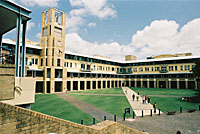| Cosmos and Culture - HPSC1100 |
|
||||||||||||||||||||||||||||||||||||||||

Description Examines the history and philosophy of science (including medicine) from antiquity to the twentieth century. Places special emphasis on contextual factors (social, political and cultural) and the role of technologies in the development of science. Topics include: Greek and Hellenistic natural philosophy; science in Late Antiquity; Medieval science; the Copernican Revolution; mechanical philosophy; the telescope and microscope; Newtonianism and the Enlightenment; natural history; Romanticism and the Counter-Enlightenment; the Darwinian Revolution; laboratory medicine; chemistry and industrial research; the twentieth-century physics revolutions and their impact on philosophy of science; the atomic bomb and Big Science.
Learning Outcomes In this course students will:
Assessment
|
|||||||||||||||||||||||||||||||||||||||||

| Contacts | Library | myUNSW | WebCT |